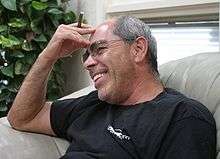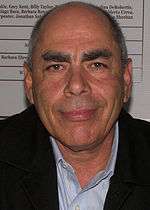Jimmy Santiago Baca
| Jimmy Santiago Baca | |
|---|---|
 Photograph by Gloria Graham during the video taping of Add-Verse, 2004 | |
| Born |
January 2, 1952 Santa Fe, New Mexico, U.S. |
| Occupation | Poet |
| Nationality | American |
| Notable works | Martin and Meditations on the South Valley |
| Notable awards | American Book Award, Pushcart Prize, International Hispanic Heritage Award, International Award. |
Jimmy Santiago Baca (born January 2, 1952 in Santa Fe, New Mexico) is an American poet and writer of Apache and Chicano descent.
Life and career
Jimmy Santiago Baca was born in Santa Fe County, New Mexico, in 1952. Abandoned by his parents at the age of ten, he lived with one of his grandmothers for several years before being placed in an orphanage. He wound up living on the streets, and at the age of twenty-one he was convicted on charges of drug possession and incarcerated. He served six and a half years in prison, three of them in isolation, and having expressed a desire to go to school (the guards considered this dangerous), he was for a time put in the same area of the prison with the inmates on death row before he was released.[1]
During this time, Baca taught himself to read and write, and he began to compose poetry. He sold these poems to fellow inmates in exchange for cigarettes. A fellow inmate convinced him to submit some of his poems to the magazine Mother Jones, then edited by Denise Levertov. Levertov printed Baca's poems and began corresponding with him, eventually finding a publisher for his first book.
Immigrants in Our Own Land, Baca's first major collection, was highly praised. In 1987, his semi-autobiographical minor epic in verse, Martin & Meditations on the South Valley, received the American Book Award for poetry, bringing Baca international acclaim and, in 1989, the Hispanic Heritage Award in Literature.[2] A self-styled "poet of the people," Baca conducts writing workshops with children and adults at countless elementary, junior high and high schools, colleges, universities, reservations, barrio community centers, white ghettos, housing projects, correctional facilities and prisons from coast to coast.

In 2004 Baca started a non-profit organization, Cedar Tree, Inc., that supports these workshops through charitable donations. As well as writing workshops, Cedar Tree has produced two documentary films Clamor en Chino and Moving the River Back Home. The organization employs ex-offenders as interns.[3]
Published works
Baca's poetry collections include C-Train and Thirteen Mexicans: Dream Boy's Story (Grove Press, 2002), Healing Earthquakes (2001), Set This Book on Fire (1999), In the Way of the Sun (1997), Black Mesa Poems (1995), Poems Taken from My Yard (1986), and What's Happening (1982). His "memoir", A Place to Stand (2001), chronicles his troubled youth and the five-year jail-stint that brought about his personal transformation. The poet Will Inman published Mr. Baca's poetry in his 1977 anthology Fired Up with You : Poems of a Niagara Vision (Border Press), one of the earliest anthologies to include Jimmy Santiago Baca's poems. Baca is also the author of a collection of stories and essays, Working in the Dark: Reflections of a Poet of the Barrio (1992); a play, Los tres hijos de Julia (1991); a screenplay, Bound by Honor, which was released by Hollywood Pictures as Blood In Blood Out in 1993; he also published at the end of 1993 Second Chances. Baca's most recent novel is A Glass of Water (2009). He published an original essay in 2013 called, "The Face," in ebook form with Restless Books,[4] along with digital editions of his Breaking Bread with the Darkness poetry volumes.[5][6]
Film
Santiago Baca wrote the screenplay for a Hollywood production, Blood In Blood Out.
See also
References
- ↑ "The Progressive Radio Show". Retrieved 2009-02-19.
- ↑ "Hispanic Heritage Awards for Literature". Hispanic Heritage Foundation. Retrieved January 11, 2011.
- ↑ "Cedar Tree Inc". Retrieved 2009-02-19.
- ↑ "The Face".
- ↑ "The Esai Poems".
- ↑ "The Lucia Poems".